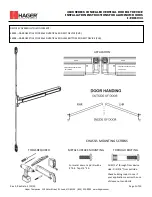
26
Troubleshooting
General remarks
Troubleshooting
Nothing happens when the torch trigger is pressed
Mains switch is ON, but indicators are not lit up
Cause:
there is a fault in the mains lead; the mains plug is not plugged in
Remedy:
check the mains lead, make sure that the mains plug is plugged in
Nothing happens when the torch trigger is pressed
Mains switch is ON, fault indicator is lit up
Cause:
power source overheated/overloaded
Remedy:
allow the power source to cool down
Cause:
wirefeeder motor overloaded
Remedy:
check wire feed liner, contact tube and wirespool brake setting
Nothing happens when the torch trigger is pressed
Mains switch is ON, ready indicator is lit up
Cause:
torch control plug is not plugged in
Remedy:
plug torch control plug into torch control plug socket
Cause:
faulty control cable or torch switch
Remedy:
replace control cable or torch switch
Cause:
faulty control transformer fuse
Remedy:
replace fuse in line with details printed on it
Unsteady arc, severe spattering, pores in the welding material
Cause:
no shielding gas
Remedy:
check the pressure regulator, gas hose, gas solenoid valve, torch con-
nection etc.
Cause:
contact tube too large or worn out
Remedy:
change the contact tube
Cause:
operating point not set correctly
Remedy:
adjust to obtain correct ratio between welding voltage and wirefeed speed
WARNING!
An electric shock can be fatal. Before opening up the machine
-
Move the mains switch to the “O” position
-
Unplug machine from the mains
-
Put up an easy-to-understand warning sign to stop anybody inadvertently
switching it back on again
-
Using a suitable measuring instrument, check to make sure that electrical-
ly charged components (e.g. capacitors) have been discharged
CAUTION!
Inadequate PE conductor connections can cause serious injury
and damage. The housing screws provide a suitable PE conductor connection
for grounding (earthing) the housing and must NOT be replaced by any other
screws which do not provide a reliable PE conductor connection.
Summary of Contents for 3100 CSA
Page 2: ......
Page 4: ......
Page 34: ...18 Schutzgasmenge einstellen 1 1 3 2 2 4 1 2 3 3 1 2 4 3...
Page 50: ......
Page 80: ...18 Setting the shielding gas flow rate 1 1 3 2 2 4 1 2 3 3 1 2 4 3...
Page 96: ......
Page 126: ...18 R glage de la quantit de gaz protecteur 1 1 3 2 2 4 1 2 3 3 1 2 4 3...
















































